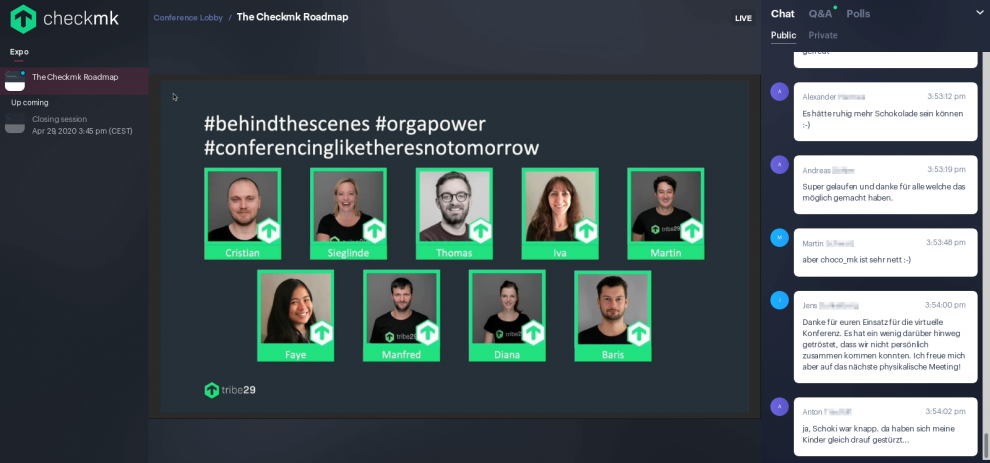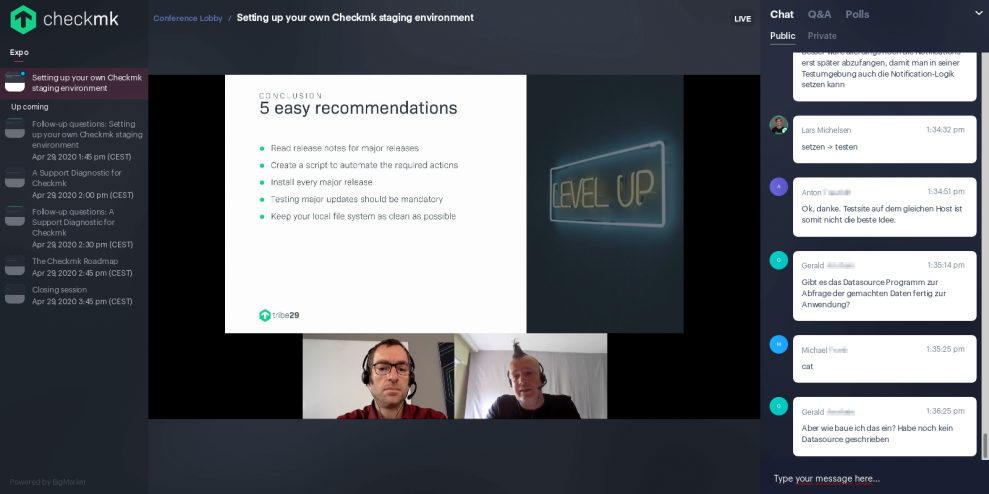Is it possible to organize an online conference with almost 300 participants in less than 4 weeks? Can a successful traditional event be moved from a conference hotel to your web browser? Yes, it can! Here is a look behind the scenes and a report from an attendee's point of view.

I have to admit that I was really sad to hear that the 6th Checkmk conference in Munich had been cancelled due to the Corona lockdown. I had been looking forward to travelling south and spending time with Checkmk developers, consultants, and users. Well, so had everybody else – including the organizers who now had to come up with a plan B. Here is what happened before and during April 28th and 29th, 2020 – online and offline.
We have a plan!
How to organize an online conference? Well, almost like any other conference, except that instead of booking a hotel, a place for the social event, a catering service, etc. you start looking for software and hardware that suits your needs.
Let's start with the software: you really want something that looks different from Zoom, Jitsi, or Google Hangouts. Everybody knows those platforms, and most of us techies are bored with all those online meetings that always look the same. Secondly, and that's even more important: you want a platform that requires no installation of a third-party app and runs in a web browser. It should support
- streaming,
- polls,
- parallel tracks,
- switching between the sessions/channels,
- rooms for 1-on-1 meetings, and
- access control.
Ideal is software that allows users to do a system requirements check in advance, for example testing the download/upload speed, firewall settings, operating system and web browser, audio and video settings.
So, I mentioned hardware... A professional looking conference involves more than presentations with your own webcam. Given that Mathias already had lots of equipment, the tribe29 team set up their own film studio in the Munich office: three cameras, microphones, lights, a real stage – not a big problem. It was only then that they realized that they also needed a powerful enough machine to work as streaming server. Since buying hardware in Corona times can be a bit of a pain, they actually sacrificed their own gaming server and turned it into a streaming server.
It takes a Team
The organizers worked almost around the clock. Apart from cancelling existing bookings, getting in touch with all the participants and re-booking them for the online event, they had to send out more than 200 care packages (not so easy when the post offices are closed), and set up a new website. The team also searched for tools to organize the 1-on-1 meetings, a general chat room and a way to provide dial-in numbers for various countries so that attendees could listen to the English audio track presented by two professional interpreters.
The organizing team managed to put most of the planned lectures and talks into a new schedule. Unfortunately, the workshop day that was originally planned for the 27th had to be cancelled – hopefully next year. On the plus side, they started a new series of "Ask me anything" sessions, talking about technical topics as well as the company.
While the tribe29 team was busy with some last minute preparations on the day before the conference, several attendees gathered on the Slack channel to say hello, chat about the new and strange situation, and expressed curiosity about whether this online conference would work. Of course, there was some joking about hair cuts (or rather the lack of them) and about the provided drinks and chocolate. It was a rather nice and chatty atmosphere on the channel, and I was happy to recognize a few friendly faces and catch up with people.
And so it began...
The virtual conference lobby opened early the next morning, and, as in real life, people said hello, waved some virtual coffee mugs around and joked about staying up too late the night before. Then it was suddenly 9:30 and Mathias and Jan opened the event. They spoke about what happened between last year's conference and now, gave an overview of this year's priorities, and told us how to participate in the online event.
Most of the talks and the discussions went smoothly and without any technical problems. Some of the participants experienced occasional problems with the sound, and some reported that the transfer from the "stage" to the "Questions & Answers" sessions did not work. But all in all, it was an impressive show!

291 people used the conference software and the Slack channels. The majority were German, but there were also participants from Austria, Switzerland, the Netherlands, Sweden, Norway, Finland, Poland, Slovenia, Hungary, Romania, the Czech Republic, and the US.
The Social Side
Some of the participants said afterwards that they missed the socializing quite a bit. It did help that there was the occasional joke on the Slack channels and even a "Share your Food" thread. But let's face it: we all missed talking to each other in person over coffee or beer.
Some of us had fun in a video chat on Tuesday evening which Marsellus had kindly set up and announced via the general Slack channel. We all brought our own drinks, listened to some music, chatted about this and that, and although it was a really nice evening, I prefer meeting in real life. Next year, hopefully.
Let's meet again!
Most people I talked to during or after the conference said they were impressed. Some even said they preferred the online version since it was easier to ask questions. Others said that they missed some real interaction. I also spoke to some people who said that the online conference was the only way they could take part in the event – not every company can afford to send employees to a 2-day meeting in Germany.
The only real complaint I heard was: "Too bad that I had to take care of my own food and make my own coffee." 😉 Hopefully we'll all meet again next year. In the meantime: thanks for all the fish and stay safe!
